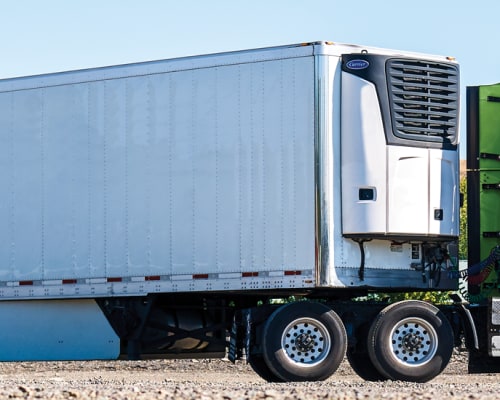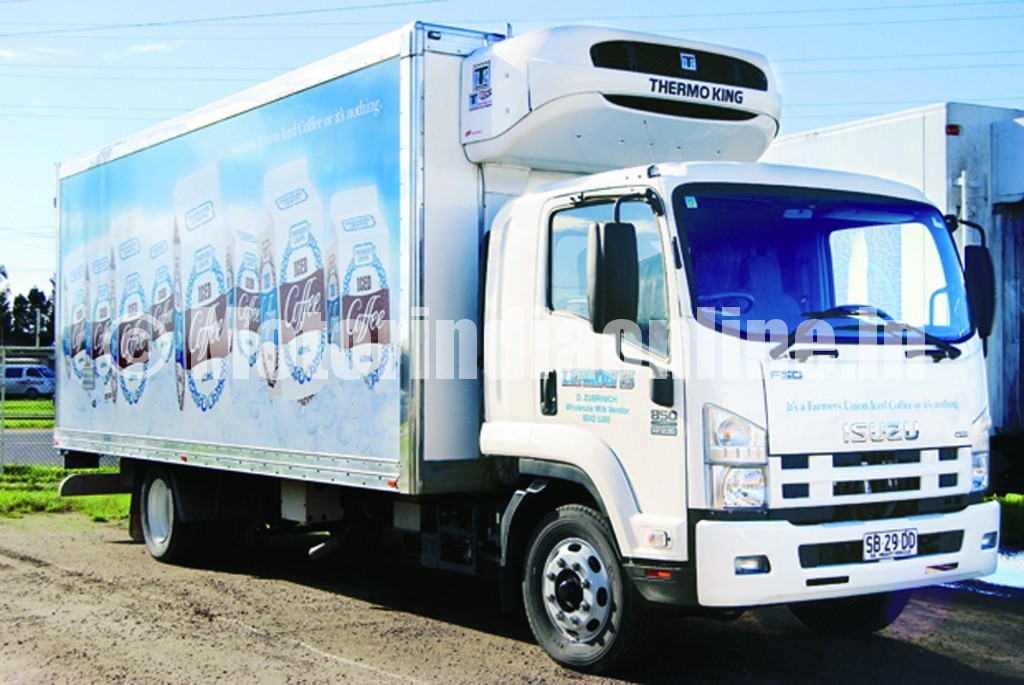Top Features to Search For in Leading Refrigerated Truck Companies
Top Features to Search For in Leading Refrigerated Truck Companies
Blog Article
An Extensive Overview of the Systems Behind Refrigerated Truck Transportation and Its Role in Food Safety
Chilled truck transportation is essential in preserving food safety, utilizing innovative temperature control mechanisms and insulation technologies to protect subject to spoiling items throughout transit. The integration of innovative surveillance systems ensures real-time oversight, permitting prompt intervention in case of temperature level deviations. These important elements not just preserve the stability of food however also play an essential function in protecting against foodborne illnesses. Nonetheless, recognizing just how these systems interact increases essential inquiries concerning their effectiveness and possible areas for improvement within the industry. What ramifications do these elements have for the future of food security?
Significance of Refrigerated Transportation
Refrigerated transportation plays a vital function in preserving the integrity and security of perishable products throughout the supply chain (cold transport companies). This customized logistics system is vital for protecting the quality of foodstuff, including fresh fruit and vegetables, dairy products products, meats, and seafood, which are susceptible to spoilage when exposed to temperature fluctuations. The ability to maintain a regulated and constant atmosphere makes sure that these items preserve their dietary worth, flavor, and safety for consumers
Furthermore, chilled transportation decreases the dangers of foodborne illnesses, which can occur from the development of damaging microorganisms in poorly saved things. By sticking to rigorous temperature level requirements, services not only abide by regulatory standards yet additionally foster customer trust fund and brand dependability. The financial implications are considerable; minimized perishing rates convert to lower losses for vendors and stores, adding to overall earnings.
Furthermore, the boosting worldwide demand for high-grade and fresh food further emphasizes the value of cooled transport. As supply chains become more intricate and expand globally, the need for efficient temperature-controlled logistics continues to expand, underpinning the whole food circulation network and guaranteeing that subject to spoiling items reach their locations safely and effectively.
Temperature Level Control Systems
Preserving ideal temperature control is important in the transport of subject to spoiling goods, and a selection of mechanisms are utilized to achieve this objective. Refrigerated vehicles use sophisticated refrigeration systems, mostly making use of vapor compression modern technology, which distributes refrigerant via evaporator and condenser coils to draw out warm from the cargo area. This procedure makes certain that the inside stays constantly great, therefore preserving the quality and security of the items being transported.
Additionally, vehicles are equipped with temperature surveillance systems that give real-time information on the inner environment. These systems typically consist of digital sensing units and alarms to sharp drivers in situation of temperature variations, enabling immediate restorative actions. Some cooled trucks also feature programmable temperature level setups, permitting for exact control tailored to particular sorts of cargo, such as vegetables, fruits, or drugs.
In addition, the usage of pre-cooling methods prior to loading boosts the effectiveness of temperature level control. By decreasing the freight location's temperature before the introduction of items, the threat of temperature level spikes during transport is decreased. These systems jointly add to a reliable cold chain, necessary for preserving the integrity and security of disposable food things throughout the transportation process.
Insulation Technologies
Insulation technologies play a vital duty in enhancing the performance of chilled truck transportation by lessening thermal exchange between the freight area and the external environment. Efficient insulation is vital for maintaining the needed temperature for subject to spoiling products, consequently making certain food security and quality during transportation.
Typical insulation materials utilized in refrigerated trucks include polyurethane foam, polystyrene, and fiberglass, each giving differing degrees of thermal resistance. Polyurethane foam, understood for its remarkable shielding properties, is typically applied as rigid panels that can be molded to fit the truck's inside.

Advanced Tracking Solution
To ensure the honesty of disposable products throughout transportation, advanced tracking systems have click now actually become a critical technology in the cooled truck industry - refrigerated truck companies. These systems use a combination of sensing units, data loggers, and real-time monitoring modern technologies to constantly check temperature, humidity, and general freight problems throughout the trip. By supplying instantaneous feedback on environmental variables, these systems allow for punctual restorative activities, therefore protecting product top quality
Modern keeping an eye on systems are geared up with wireless connection, enabling smooth information transmission to logistical centers and stakeholders. This connectivity assists in remote monitoring, which is important for preserving compliance with sector regulations and criteria. Alerts can be created in real-time, informing operators of any kind of inconsistencies from pre-set limits, hence decreasing the danger of perishing.
Furthermore, the integration of sophisticated analytics and artificial intelligence formulas enhances predictive abilities, permitting much better planning and risk assessment. Historical information accumulated from these systems can inform future transport approaches, optimizing courses and lowering prospective dangers. On the whole, the deployment of innovative surveillance systems stands for a considerable development in the refrigerated transport market, reinforcing the commitment to protecting the high quality and safety and security of subject to spoiling items throughout their trip.
Effect on Food Safety Criteria
The integration of innovative surveillance systems in cooled vehicle transportation has significantly affected food safety and security requirements throughout the supply chain. These systems allow real-time monitoring of temperature level, moisture, and other important criteria crucial for keeping the basics integrity of perishable goods. By guaranteeing that products stay within defined temperature varieties during transportation, these technologies minimize the risk of microbial development and wasting, which are critical in food security.

The adoption of information analytics also enables positive decision-making, enabling business to identify possible concerns prior to they escalate into food safety violations. Therefore, the unification of innovative surveillance systems not only improves functional efficiency yet also promotes greater liability in the food supply chain. This advancement emphasizes the crucial duty of technology in raising food security requirements and making certain consumer confidence in the products they get.
Verdict
Finally, chilled vehicle transport is vital for maintaining food safety and security through reliable temperature control, advanced insulation modern technologies, and continual tracking systems. These mechanisms work synergistically to maintain the top quality of subject to spoiling goods and minimize address the risk of foodborne ailments. Adherence to stringent food safety and security criteria is achieved via the execution of these modern technologies, highlighting the critical duty of refrigerated transportation in the food supply chain and its effect on public health and wellness.
Cooled vehicle transportation is important in maintaining food safety, employing advanced temperature level control devices and insulation technologies to secure disposable items throughout transit - transport refrigeration. Correct upkeep of insulation integrity, consisting of normal checks for wear or damage, is also important to receive the performance of chilled transportation systems and make certain compliance with food security laws
The integration of advanced tracking systems in chilled vehicle transportation has significantly affected food safety and security standards throughout the supply chain.In final thought, cooled vehicle transport is vital for keeping food safety with effective temperature level control, advanced insulation technologies, and continual surveillance systems. Adherence to rigorous food safety and security requirements is achieved via the implementation of these technologies, highlighting the essential function of chilled transport in the food supply chain and its influence on public health and wellness.
Report this page